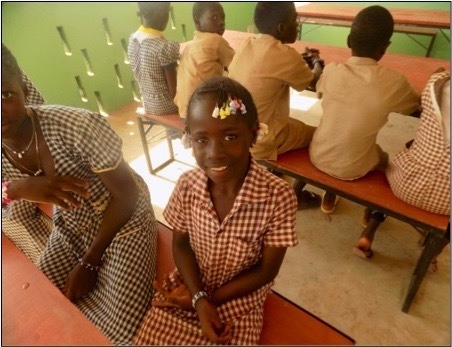Kadiatou Diarra, age 8, is a smart girl who lives in Ballabougou with her mother, two sisters, and a brother. Where she lives is a big part of her challenge: Ballabougou is a rural village nearly 120 miles north of the city of Boundiali. Like most villages in northern Côte d’Ivoire, Ballabougou lacks adequate health, education, and sanitation facilities and services—as a result of successive crises in Côte d’Ivoire for nearly a decade, from 2002 to 2011. During that time, the country was split and government services did not reach the north. While the country has recovered from the crises, their effects linger and rural populations of the north are still marginalized. In this context, Cargill, Ivoire Coton, and the Aga Khan Foundation joined forces through a schools strengthening project aimed at increasing access to education with the improvement of school infrastructure and reinforcement of school management committees.
Better facilities for better learning
Before, Kadiatou attended Ballabougou’s primary school where her studies were often interrupted due to socio-economic and environmental causes. The town’s old primary school consisted of a single building and an open-air hangar. During the rainy season, the teachers often had to cancel their lessons or cut them short, since they could not teach the children in the rain.
Kadiatou and her classmates missed school many times every year, and the quality of their education suffered. The old primary school also lacked a canteen. This often posed a problem for Kadiatou and many of her classmates, as their families did not always have the resources to provide their meal. Kadiatou’s mother often preferred to bring her and her siblings to the farm rather than to send them to school. That way, she could provide food for her children from their farm work. This led to more interruptions in Kadiatou’s schooling and bad grades. This made both Kadiatou and her mother sad, since Kadiatou loves studying and playing with her friends from school.
Now, through their joint program, Cargill, AKF, and Ivoire Coton built a new three-class building and a school canteen. The new building brought an end to weather-related class cancellations and created a more welcoming atmosphere for learning. Plus, children are now able to receive meals from the canteen, lowering economic barriers to education and allowing them to concentrate on their studies. With the new canteen, Kadiotou’s mother decided to let her to remain at school.
Reducing structural barriers to education
Another factor hampering access to education for Kadiatou and other girls was the absence of latrines. For many school-aged girls, the lack of toilets made them vulnerable to many risks, and was also embarrassing and uncomfortable. The lack of acceptable sanitation facilities created a hostile environment for girls.
As part of the wider project, AKF and its partners constructed three latrines at the new school for the children and teachers. This has created a more inclusive and comfortable environment for all children, and the toilets have improved sanitation and hygiene at school.
Fostering social and educational achievement
Kadiatou began attending class more regularly and her grades significantly improved. She even earned the best overall grade of her classroom.
Kadiatou’s teacher and family are very proud of her achievements. Her teacher especially praised her participation in the classroom: “Kadiatou always asks questions in class, and volunteers for activities.”
Kadiatou has also become popular among her classmates, and was recently named a model student of the Ballabougou primary school.
Kadiatou herself is quite happy with the changes in her school, and has started thinking about her long-term goals. Recently she said: “My school is now big and beautiful with a new canteen and latrines. I can’t wait to become the next director!”

The project completed its work in April 2018 after two years. In those two years, the project partners rehabilitated 21 classrooms and two canteens across seven schools, constructed one primary school (with a canteen and latrines), and provided training for seven school management committees, four canteen coordinators, and eight cooks – all located in the marginalized rural north of Côte d’Ivoire. These activities reached 3,273 students and 81 teachers in the area.
The prospects for Kadiatou’s future as a school director look brighter.
Melissa Salazar is a Grants Associate at the Aga Khan Foundation in Còte d’Ivoire.